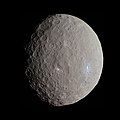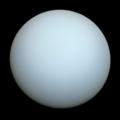A classical planet is an astronomical object that is visible to the naked eye and moves across the sky and its backdrop of fixed stars (the common stars...
25 KB (1,958 words) - 18:42, 4 May 2025
Planetary symbols (redirect from Planet symbol)
astronomy to represent a classical planet (which includes the Sun and the Moon) or one of the modern planets. The classical symbols were also used in...
52 KB (4,922 words) - 07:41, 13 May 2025
total of 7 planets. The ancient Babylonians, Greeks, Persians, Romans, Medieval Christians, and others thought of the 7 classical planets as gods and...
60 KB (6,332 words) - 01:06, 12 April 2025
this class. The term "dwarf planet" would have been available to describe all planets smaller than the eight "classical planets" in orbit around the Sun...
57 KB (6,764 words) - 03:58, 6 May 2025
has eight planets by the most restrictive definition of the term: the terrestrial planets Mercury, Venus, Earth, and Mars, and the giant planets Jupiter...
199 KB (20,934 words) - 17:02, 8 May 2025
like the eight classical planets of the Solar System. The prototypical dwarf planet is Pluto, which for decades was regarded as a planet before the "dwarf"...
101 KB (9,264 words) - 16:15, 20 April 2025
Astrological symbols (section Classical planets)
overlapped. Frequently used symbols include signs of the zodiac and classical planets. These originate from medieval Byzantine codices. Their current form...
56 KB (2,432 words) - 06:19, 27 April 2025
solid inner core. Mercury is a classical planet that has been observed throughout history and recognized as a planet (or wandering star). In English...
156 KB (16,132 words) - 11:44, 19 May 2025
errantes, lit. 'wandering stars'), were the five naked-eye planets (the Classical planets) known to ancient Greek and Roman astronomers, who assigned...
15 KB (1,861 words) - 17:04, 12 April 2025
Western astrology (section Classical planets)
being the brightest planets were given rulership of the brightest months of the year and Saturn the coldest furthest classical planet was given to the coldest...
50 KB (4,627 words) - 00:27, 4 December 2024
have low-eccentricity and sometimes low-inclination orbits like the classical planets. The name "cubewano" derives from the first trans-Neptunian object...
22 KB (2,362 words) - 18:25, 1 February 2025
Planetary-mass moon (redirect from Satellite planet)
dynamics). This conceptualization of planets as three classes of objects (classical planets, dwarf planets and satellite planets) has not been accepted by the...
30 KB (2,249 words) - 18:40, 22 April 2025
moons List of planet types (etymologically accepting of multiple categories) Lists of astronomical objects Classical planet Definition of planet List of exoplanet...
9 KB (813 words) - 17:27, 15 May 2025
one of the seven planetary spheres, or what are known as the seven classical planets: the Sun, Venus, Mercury, the Moon, Saturn, Jupiter, or Mars, along...
92 KB (7,785 words) - 13:46, 26 March 2025
making a total of seven planets. The seven days of the week of the Hindu calendar also corresponds with the seven classical planets and European culture...
4 KB (287 words) - 10:23, 20 April 2025
7 (section Classical antiquity)
associations in religion, mythology, superstition and philosophy. The seven classical planets resulted in seven being the number of days in a week. 7 is often considered...
29 KB (2,747 words) - 17:16, 14 May 2025
Planetary hours (category Planets in astrology)
The planetary hours are an ancient system in which one of the seven classical planets is given rulership over each day and various parts of the day. Developed...
24 KB (1,720 words) - 23:39, 22 October 2024
Nabu (category Articles containing Classical Syriac-language text)
scribes, wisdom, and the rational arts. He is associated with the classical planet Mercury in Babylonian astronomy. The Akkadian nabû means 'announcer'...
11 KB (1,036 words) - 13:47, 11 May 2025
Planet Nine is a hypothetical ninth planet in the outer region of the Solar System. Its gravitational effects could explain the peculiar clustering of...
184 KB (19,715 words) - 18:53, 9 May 2025
Magic Classical (formerly Scala Radio) is a British digital radio station owned and operated by Bauer Media Audio UK. The station was launched in March...
7 KB (741 words) - 02:41, 19 May 2025
Uranus (redirect from Planet Uranus)
the planet with a subprobe of Tianwen-4. Like the classical planets, Uranus is visible to the naked eye, but it was never recognised as a planet by ancient...
159 KB (15,647 words) - 20:58, 15 May 2025
Galilean moons (redirect from Medicean planets)
readily visible Solar System objects after Saturn, the dimmest of the classical planets; though their closeness to bright Jupiter makes naked-eye observation...
56 KB (5,619 words) - 23:14, 22 April 2025
star refers to so-called classical planets, with 'planet' meaning 'wanderer', coming from the Greek word πλανήτης (planētēs). Wandering star may also...
1 KB (207 words) - 21:30, 27 April 2025
for the planet in Persian, Urdu, Malay and Swahili, among others Chinese 火星 [Mandarin Huǒxīng] 'fire star' (in Chinese the five classical planets are identified...
4 KB (473 words) - 05:49, 5 May 2025
distinguished as Western classical music, as the term "classical music" can also be applied to non-Western art musics. Classical music is often characterized...
97 KB (10,351 words) - 12:53, 10 May 2025
Astronomical symbols (section Symbols for the planets)
M☉, and R☉, respectively) as units of measurement. Symbols for the classical planets appear in many medieval Byzantine codices in which many ancient horoscopes...
109 KB (6,703 words) - 02:39, 24 April 2025
five elements with the five planets (Jupiter, Mars, Venus, Saturn, and Mercury) similar to the way the classical planets were associated with different...
22 KB (2,213 words) - 04:24, 10 May 2025
definition of a planet that was proposed by the International Astronomical Union (IAU) in August 2006. According to IAU definition of planet, a planet is an astronomical...
35 KB (3,456 words) - 09:26, 8 April 2025
including English, the days of the week are named after gods or classical planets. Saturday has kept its Roman name, while the other six days use Germanic...
63 KB (6,930 words) - 13:48, 6 May 2025
realms of deities and with observed celestial bodies such as the classical planets and fixed stars. Beliefs in the plurality of the heavens were not...
28 KB (3,133 words) - 17:40, 3 May 2025


















